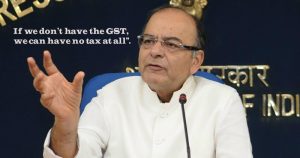
‘Demonetization + GST = Bigger economy’ Says Arun Jaitley, Assures GST Placement By Sept 2017
After bridging the issues and solutions of demonetization, the central government now rolled back to Goods and Services Tax (GST) bill. Earlier, the bill got approved in Lok Sabha, Rajya Sabha and got amended by President of India.
Now, the implementation process of GST is in progress.
Union finance minister Arun Jaitley voiced about GST after a long time, he said that the implementation of GST by September 2017 is constitutionally compulsory. He further added that further delay in implementation might impact the functioning of tax reforms.
On Friday, Jaitley spoke at the Hindustan Times Leadership Summit in New Delhi, said the GST notification came on 16 September 2016, so by 15 September 2017, “if we don’t have the GST, we can have no tax at all”.
The minister further quoted that it is a “constitutional compulsion” to implement the GST by September.
Jaitley firmly stated that implementation of GST along with demonetization will add bigger progress to the Indian economy, arresting concerns from a certain section of industry and political parties on its long-term impact on the economy.
“Demonetisation plus GST means bigger economy, and higher and better GDP,” Jaitley said. He said both the moves will lead to a cleaner tax system in the country.
The financial minister then explained the benefits of demonetization alongside GST in four points. He elaborated the possible financial windfall for the government due to it
- One, more money in the banks because of the rush in deposits will give banks the ability to lend at a more rational cost.
- Second, money not deposited with the Reserve Bank of India but was in circulation earlier before the ban can be used for constructive work.
- Third, the exemplary tax (unaccounted for cash) will add to the government kitty.
- Four, it will expand India’s tax base.
“I am here to clarify that GST will definitely be implemented. I read some comments about demand for the reconsideration of GST. But if somebody goes through the constitutional amendments, he or she will understand there is no scope for such reconsideration,” said Mr. Jaitley.
“The Centre had notified certain provisions in the constitution amendment law for GST with effect from September 16 last. The old tax regime can continue for one year. If not implemented, tax collection will be difficult for States after September 16, 2017. If somebody tries to create a roadblock for GST implementation neither any scope nor much time is left for such attempt,” he said.
Explaining the mandatory reasons and consequences of GST, the Finance Minister said, “after GST implementation the whole country would become one big market. The country was united from the political point of view, but financially, it was never cohesive. Tax rate differed from one state to another, sometimes there was duplication in tax imposition. The GST leaves no scope for that. There would be the seamless flow of goods and services.”
Earlier speaking at Make in Odisha conclave, Mr. Jaitley said, “over a period of time, this will help in the growth process. It will help the consuming State like Odisha.”
“Tax evasion would be increasingly extremely difficult because from inception to the end the whole process of would be captured on the IT backbone that is being developed. Coupled with this, our country will move to a far clear and formal economy. The informal sector will be formalized,” he said.